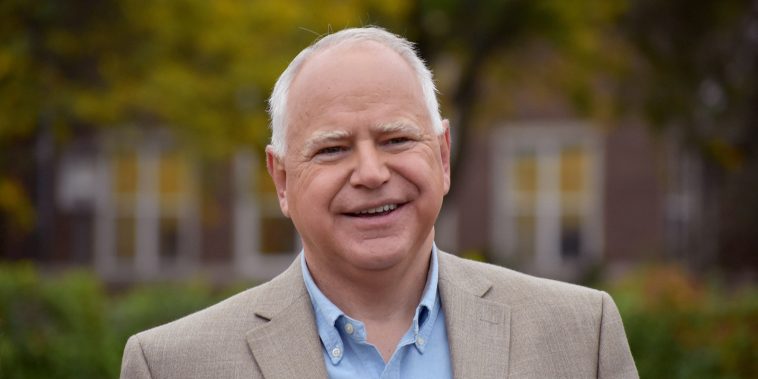Four individuals with a military background and a common acquaintance with Governor Tim Walz aired their thoughts recently during a chat with renowned podcast host Megyn Kelly, made available to the public this Monday. Their discourse was mainly focused on certain discrepancies they had noticed in Governor Walz’s recounting of his 24-year service in the National Guard. A recurring theme in their discussion centered around how Walz cited his retirement unaware of his unit’s imminent deployment to Iraq. The allegations also touched upon his repeated assertions of retiring as a ‘Command Sergeant Major.’ From their conversation, it appeared the quartet shared some rather unfavorable opinions towards the man who now seeks to be vice president, supporting Democratic presidential candidate Kamala Harris.
In a nutshell, their thoughts on the Governor were far from cordial. Kelly’s show shared a sneak peek where the participants could be heard deeming Walz as someone with a tendency for dishonesty, lack of courage, and ethical unreliability. One of the people voicing his concerns about Walz went so far as to accuse him of manipulating his military experience, making it ‘all about him.’ Another echoed these sentiments and labeled him as someone projecting a false military persona.
Claiming that Walz had a propensity for untruths, one of the panelists expressed, ‘He tends to misrepresent facts habitually. He’s known to fabricate trivial things as well.’ Their collective concern seemed to be the ruler stealing the thunder rightfully belonging to the whole team, bottling it, and using it for his advantage.
“Emotions like fear are a reflex, but courage is a choice,” one of the veterans commented during the podcast. By his inference, Walz consistently chose the unheroic path whenever it was his turn to make a decision. His appraisal presented a man who consistently picked personal comfort over valor.
A unique highlight of the episode was when Kelly brought together a string of clips wherein Walz introduced himself as a ‘retired Command Sergeant Major’ or let others do the same without interjecting, despite holding that title only provisionally and not up until his retirement. This variety of clips seemed to unravel a different narrative to his own, raising questions about inconsistencies in his past.
Kelly wrapped up the segment with an indictment of collective evidence, all clips presented during the episode featured Walz propagating the narrative of his retirement as a Command Sergeant Major. She underscored the crux of the issue, noting that each instance of this self-introduction occurred post-September 2005, after his rank had been corrected. Kelly drove home the point, ‘He was fully aware of his retrospective demotion.’
If the assembled evidence and collective testimonies of the military veterans hold weight, they hint at Governor Walz’s amplifications and exaggerations of his military career. Though allegations stay as just that until proven, this incident underlines the importance of public figures maintaining consistent narratives of their history.
Another concern emerging from this discourse is the potentially manipulative use of military prestige for personal gain. A valorous service record, according to the veterans interviewed, is supposed to contribute to the collective honor of the service unit, and not meant to be ‘bottled up’ as an individual’s personal bounty.
The recurring theme of lying about one’s achievements, as alleged by the veterans, becomes a lapse of moral integrity. If these charges find a firm standing, they hint at a person making narratives to fit an image rather than sharing authentic history.
Further credence to these allegations comes from spliced video evidence. Clips of Walz introducing himself or allowing introductions reflecting a modified ‘reality’ of his military rank add to these concerns. This is not just about the way he represents himself, but also about the inaccuracy of the information he fails to correct.
This conversation’s undercurrent had a tone of disappointment and disillusionment with someone they once knew in a military capacity. While they threw heavy accusations of habitual dishonesty and lack of moral courage, it would be prudent to note that these are perceptions of individuals based on their experiences and interpretations.
Contextually, this recorded conversation with Megyn Kelly brings to light several doubts about Governor Walz’s true military service history. It opens a dialogue about the importance of truthfulness in recounting one’s past, particularly for those in influential positions. Transparency in these scenarios takes the front seat, providing a clear and authentic narrative to the public.
Political figures, it was argued, have a moral obligation to retain historical accuracy. The podcast episode seems to call for a higher sense of responsibility and integrity from those who hold public offices, especially when it comes to their personal histories.
While the charges presented in this episode may or may not get proven, they certainly stir up a conversation about public figures’ credibility. They also underscore the need for maintaining historical accuracy, emphasizing that the glory of service should be collectively attributed rather than personalized.
Lastly, the core of this discourse also questions the narrative around our heroes. It serves as a reminder of the importance of shared honor, truthfulness, and consequences of actions in the public eye. In an age where perception can swiftly become reality, it underlines the value of fact-checking and due diligence before accepting any narrative.
You can watch the full video below:


